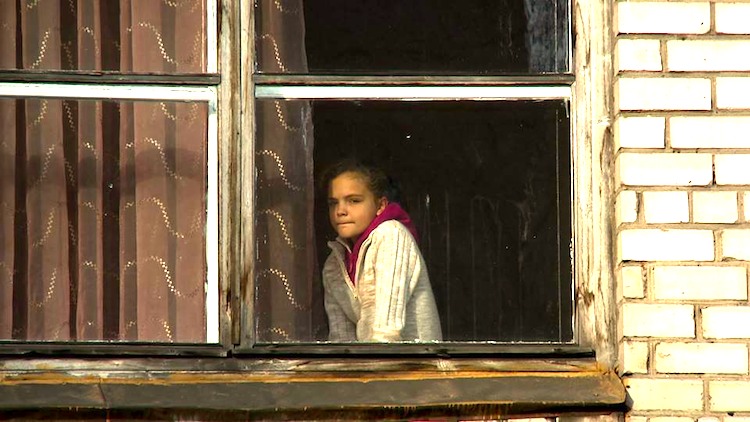By Joe Bendel. Over 300 so-called “Pipeline Babies” have become the new face of Putin’s Russia. Often special needs children, they had already met and begun forming relationships with their presumptive American parents. However, as they waited for the paperwork to be finalized, the Putin regime banned American adoption as the latest salvo in his neo-Cold War. With no realistic prospects of Russian adoption, it is the children who will suffer the most as a result, but looking after the weak and the vulnerable was never the Russian strong man’s priority.
Admirably, the filmmakers behind a new film documenting the complicated adjustment process for three of the final (as of now) Russian orphans adopted by an American family are using the Toronto premiere of their film to shine a spotlight on the Pipeline Baby issue. Masha, Marcel, and Vadim are not Pipeline children, but the Diazes might sometimes wish they were during the rocky course of The Dark Matter of Love, which screens during the 2013 Toronto International Film Festival.
Adopting one child is a considerable undertaking. Taking on three at once is rather daunting. Recognizing the potential challenges (at least on an intellectual level), the Diaz family enlisted scientific help. Dr. Robert Marvin and his associate Nicole Millirin will monitor and counsel the family, reviewing video footage that would become part of this film. Masha is a classic case of the emotionally guarded orphan who erects nearly impenetrable protective walls around herself. In contrast, the younger twins, Marcel and Vadim, indulge in the sort of histrionic acting out also commonly observed in recently adopted children. Altogether, they are quite a handful, leaving the Diaz parents little time for their biological teenage daughter, Cami.
Throughout much of the second act, viewers will be reminded of what they say about good intentions. Nonetheless, Marvin and Millirin offer the family some very constructive feedback. The authoritative Marvin also provides the audience a lucid thumbnail sketch of the evolution of developmental psychology over the last fifty-some years. Looking a bit like Max von Sydow’s sensitive younger brother, Marvin is a reassuring presence who adds quite a bit to the film.
Frankly, the documentary might have benefited from a bit more of Marvin and Millirin. While the Diazes are clearly good people with strong values, ninety-three screening minutes is a long time to spend with them. Indeed, Dark Matter could easily be whittled down to an hour for a later PBS broadcast.
Despite some painful moments, Dark Matter will leave viewers largely optimistic regarding the Diaz children’s future. It certainly never offers any inadvertent justification for Putin’s iron-fisted American adoption ban. Considering Masha and the twins were adopted just before the decree was passed, it is perfectly logical and appropriate for McCarthy and her colleagues to take up the Pipeline Baby cause as part of their awareness campaign. Millirin has even sacrificed some privacy by announcing she happens to be a lesbian adoptive mother, in protest of both the Russian government’s adoption ban and their harsh new anti-gay laws. It is rather incredible how much there is to be alarmed by in Putin’s Russia, such as the continuing persecution of dissenting activists, like Pussy Riot. What a perfect spot to hold the Olympics.
Recommended for those interested in its family development issues, The Dark Matter of Love screens again today (9/9) and Friday (9/13) as part o this year’s TIFF. Concerned viewers can also sign an online petition on behalf of the over 300 affected children here.
LFM GRADE: B-
Posted on September 9th, 2013 at 3:38pm.
